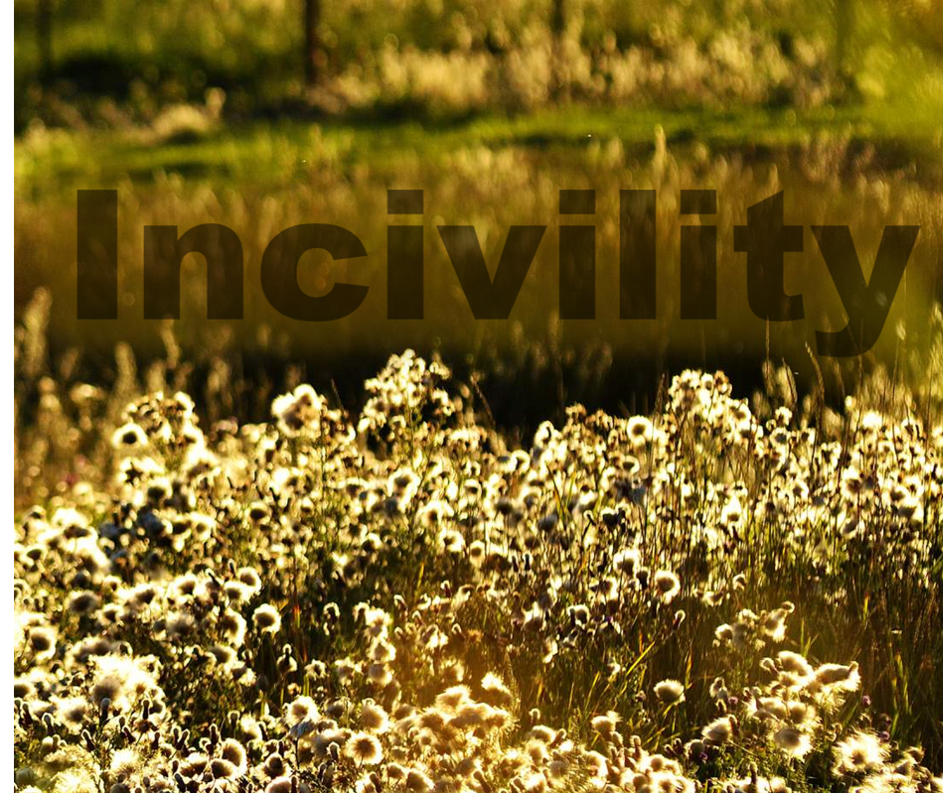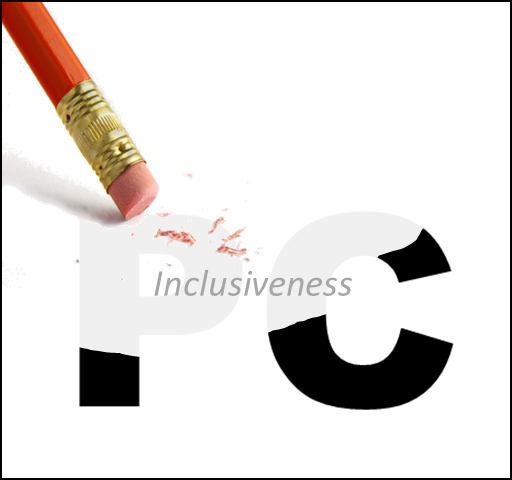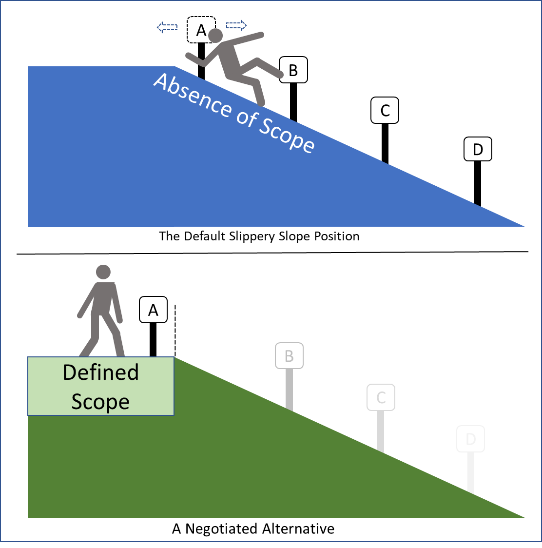I started this blog in the summer of 2015 with the intent of encouraging dialog around improving civil discourse. Just an experiment, and a subject I thought important. I started with a fair amount of energy and a burst of posts. Then I stopped – having stepped into a new undertaking, a new job. And candidly, I have not updated that blog since then. Little did I realize how topical the concept (not my blog) would become with the lead up to, and the advent of, the elections of 2016 — and what has happened since.
Unfortunately, Incivility is Flourishing

Sadly, in that time, incivility has flourished. As opposed to a thing that should be addressed, it has become something some folks laud and cheer for. At the center of this, though not the sole cause of it, is the current President of the United States.
Even now, I am struggling for a civil way to emphasize the wrongness of his actions, his behavior, his statements, and his example in the most visible role in the world. I will try to do so civilly – knowing full well the possibility of brash and uncivil responses. Some of us encourage simple, civil, guideposts and some say screw that.
Pseudo-Disclaimer
First a pseudo-disclaimer: being civil does not mean we cannot use vivid descriptions, and rich critiques of actions, implications, or consequences. Debate can and should be energetic and laced with language that illustrates. But that is the key thing – language that illustrates, that illuminates, that expands concepts is different from language that denigrates, that obfuscates, that blatantly misrepresents, and closes down dialog and thoughts. So, I will attempt to follow this with descriptions that are accurately critical rather than simply or recklessly negative.
I would submit that a bulk of what Donald Trump has said or tweeted in this timeframe fits into the second set of descriptions: derogatory, misrepresentative, meant to shape the conversation but not to actually inform it.
On Political Correctness
Let’s start with a something that had a huge emphasis in 2015 but has faded somewhat from the lexicon since — the term “political correctness” or being PC. Among other things, Donald Trump led off with a play to the anti-PC crowd. Anti-PC is, or was, a significant backlash based on the concept of being too sensitive to certain circumstances and too accommodating to those with complaints. Some suggested such accommodation was becoming pervasive and eroding our society. So, the response was direct and aggressive pushback. PC was frequently uttered as a slur — “We don’t need all this PC crap, it’s out of control.” Trump has uttered such things often.

A rational person might concede that, hypothetically, taken to the extreme, some ultra-accommodation (whatever that might be) could encumber certain situations. But that is just it — there was no mass movement for dramatic accommodation. Few were seriously asking for outrageous shifts in behavior. Most of what was being asked for and decried by the PC-as-slur contingent, were requests for simple kindness, decency, and inclusiveness — the last of which, I believe, is the real underlying issue. Greater inclusiveness, by its very definition, means those that were already “in” are now asked to share some of the space with those that were previously excluded. Some people don’t want to share. This is a topic for a much deeper discussion. For now, let’s briefly look at the battle over the phrase Happy Holidays. It is meant to be more inclusive. There was no nationwide campaign to abolish the phrase Merry Christmas (though some suggested there was). If there was such a demand or a proposed law (ridiculous considering multiple facets of the first amendment), that would be wrong. This was not that. It was, and still is, simply a request to think more broadly – to consider concurrent holidays, and observations thereof, as well. As well – not in place of. How does the general observation negate the more specific one? Of course – it doesn’t. This was really a verbal proxy-war, a surrogate, for those feeling Christianity is being marginalized. That too is a subject for another post. The PC backlash was largely hyperbolic – yet it stirred a portion of the public.

Then there is the semi-clever slippery slope argument. It goes: if we accommodate A then we will be forced to accommodate things like B, C, and D in the future. The slippery slope argument has limited merit and is often a simple dodge from expanded dialog. Slippery slope, or avoiding it, comes down to scope. Admittedly, defining scope in civic issues takes time and effort — and dialog. Yet, we can easily make a distinction between a minimal level of effort required to interact civilly and the more challenging implications of codifying things into law. What I am talking about here is the former. I listed a degree of scope earlier in my pseudo disclaimer. But the hardline anti-PC crowd would prefer to lump this concept of civil discourse in with their fears of the byproducts of legislating greater inclusiveness. One might flow to the other, but they are not the same thing.
Ironically, there is an opportunity to have a civil conversation with those concerned with too much PC, where such concerns can be discussed, and their angst might be accommodated. Yet my guess is that we could divide those folks and the likely outcome into three groupings. First, those that would completely brush it off as participating in being PC. Second, those who would engage, but not do so in a civil way, saying there is no need to be constrained by PC. Third, those that would engage in good faith, civilly. I fear that the first two groupings would outweigh, or at least out-shout, the third.
A Shift
Yet the utterance of PC as slur seems diminished because it has lost the spotlight to a more bold and direct approach – an uptick in open, often puerile rather than reasoned, and sometimes aggressive, hostility (in this context puerile is a descriptor not denigration). At the center are myriad examples of our POTUS simply bashing opposing thoughts, besmirching people’s or an organization’s character and intent, using derogatory nicknames, outright lying, often in the tone and style of a riled adolescent. And he has a big group of fans that applaud it – saying he is just being like, if not speaking for, the common man. I sincerely doubt many of us were taught that these were the qualities to aspire to as grown-ups. Most of us were taught the contrary. Yet the public nature of these awful behaviors by Trump is establishing a degree of social acceptance of said behaviors. He often ends a tweet with “Sad!” The fact that incivility is flourishing, and that someone in the role of POTUS is brandishing and wielding it, is sad. It is a regression. It is regression in the both general and psychological definitions — a reversion to an earlier and less developed stage.
Civil discourse, emphasis on civil, is not about squashing beliefs, stifling dialog or neutering healthy debate. Common decency, and civil discourse, are not new concepts. Both are critical to a functioning society.
Peril


(perhaps at any cost)
We have arrived at the perilous convergence of:
a) a devaluation of kindness, decency, and acceptance;
b) the elevation of the individual and winning, sometimes at any cost, over the common good;
c) the expectation of immediate answers and outcomes; all coupled with a change in the composition (dare I also say complexion) of our citizenry. It is not simply a challenge – it is genuine peril. Perilous because that devaluation is being actively, not just incidentally, justified.
Perilous because winning has the status of a deity coincident with the proliferation of churches espousing the gospel of prosperity.

qualifiied answers
Perilous because people are borderline addicted to a shortened-time-to-X — brought forth by the proliferation of the internet and mobile devices. Where, among other things, X is often the quickest, rather than a qualified, answer. That network, those devices, can facilitate greater human interaction, can connect us to vast information sources, can bring us together and expand awareness. Yet, almost paradoxically, laden with digital escapism, permeated with abbreviation, offering semi-anonymity, and tainted by active disinformation campaigns, they seem to have made us less connected to each other — and less civil.
It is worth saying, this is not an example of irrational anger and a fervor to tear someone down. It doesn’t spring from a few cherry-picked incidents cobbled together in an attempt to paint someone in a bad light. These thoughts are based on consistent, recurrent, public actions and statements made by Trump. This is a direct, fact-centered critique of a specific person’s actions, and the way it relates to the broader phenomenon of growing incivility.
Perilous, because a person in an ultimately visible and influential position, a position that could be setting a positive example and trend for individuals and the world, is instead doing precisely the opposite. Our POTUS, exemplifies the baser behaviors instead of the loftier ones. He calls heads of state, political opponents, leaders of organizations, celebrities and others, childish names. He openly praises despots and admires their strength. He cries “unfair” frequently, playing to the rudimentary, selfish, instinct of “I didn’t get mine” or “we didn’t get ours” — establishing the mindset of a zero-sum competition and a divisive form of I or us against them. He speaks of greatness and winning which usually devolves into those same, finite, small, I and us constructs. He lies easily and often to justify his actions. He laces his comments with fuzzy statements and loopholes affording himself room to mitigate and deny later. He won’t admit to mistakes — instead usually doubling down and surrounding it with bolder, if flimsier, nonsense. Or, he just outright denies something he wrote or said. There is a portion of the population that eat it up and even revel in it, a portion that actively defend it, another that accepts it as a means to other ends, some that deflect to “all politicians do that”, and some that are just not paying attention. Through mass exposure and constant repetition, with open or tacit support, it is cast as acceptable when it should not be. Perilous. And that is only one facet of an even broader danger. Because it is not just the uncivil delivery, it is the content — awful content. That, too, is for another post. Thankfully, there is also a broad gathering of folks speaking up against this peril and that danger.
Conclusion

When I started my blog, in 2015, I was hoping to simply nudge along a dialog about enhancing our conversations and interactions toward improving our society in some small way. It didn’t. I didn’t. And in the intervening years, much larger forces have driven things in the opposite direction. I was concerned then. I am gravely concerned now. I have no idea if my comments will influence even one other soul – but I hope so. So, in the off chance I can contribute, if only a little, I think I will start writing again.